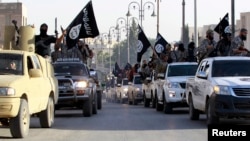Terrorist groups need a steady influx of money in order to carry out their deadly agendas. So it makes sense to prevent terrorists from raising funds and using the assets they already possess.
This is particularly true of ISIL. ISIL primarily supports itself through criminal activity, including robbing banks and receiving ransoms for kidnapped victims, and extorting from individuals and businesses, and raiding villages and towns. It also sells oil stolen from oilfields under its control and raises funds externally from donations. ISIL receives some money from outside donors, but that pales in comparison to their self-funding through criminal and terrorist activities.
“Today ISIL controls more territory than Al Qaeda ever has, which means it has access to money and resources on an unprecedented scale. These funds are the lifeblood of its campaign of brutality,” said Special Envoy Amos Hochstein.
Deputy Assistant Secretary for Terrorist Financing, Jennifer Fowler said, “Last year ISIL may have earned as much as several million dollars per week, or 100 million dollars in total, from the sale of oil and oil products to local smugglers who, in turn, sell them to regional actors, notably the Assad regime.”
The international coalition has taken numerous steps to trim ISIL’s profits. First, they are shutting the terrorists out of the global financial network, by preventing banks in ISIL-controlled territory from conducting transactions through the domestic or international financial system.
To choke off the amount of oil ISIL can bring to market, coalition air strikes are targeting ISIL-held oil fields and refineries. Also, Turkish and Kurdish authorities are focused on seizing oil that makes it out of ISIL-held territory.
The United States is also working with its partners to adopt a “no concessions” policy with respect to ransom payments for kidnapping. And we are working with partners in the Gulf to disrupt the flow of donations to all terrorist groups.
In the future, said Deputy Assistant Secretary Fowler, we will disrupt the movement of supplies and oil to and from ISIL-controlled territory; prevent unregulated financial companies from providing support to ISIL; target the financial activities of foreign terrorist fighters going to Iraq and Syria; and work with our partners to develop a common approach to countering ISIL’s financial activities.
“Just like any commercial enterprise whose income is less than its expenses, ISIL’s financial strength will diminish unless it is able to find alternative sources of revenue or take additional territory,” said Deputy Assistant Secretary Fowler.
The international coalition is working diligently toward this goal.






